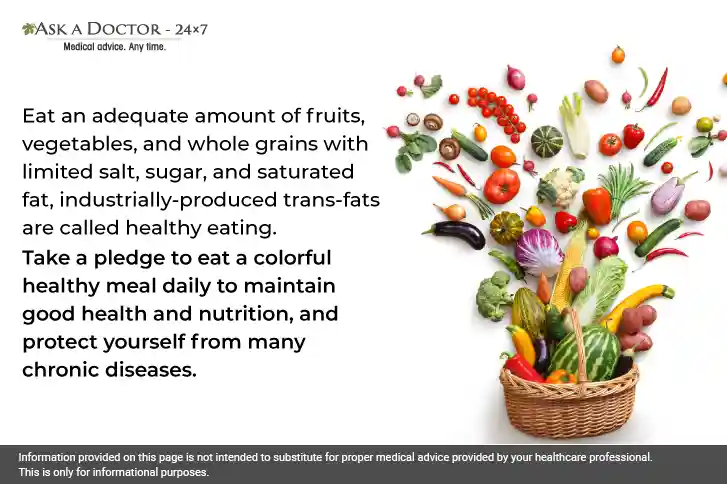What Is Healthy Eating And Why Is It Important To Eat Healthy?
Take a look at anyoneŌĆÖs ŌĆśto-achieveŌĆÖ list. Eating healthier is surely to figure as one of the top goals on their list. After all, who has not heard of the age-old but very apt adage ŌĆśyou are what you eatŌĆÖ. What you put inside your body will reflect on the outside. So, this National Nutrition Week, let us explore what does eating healthy actually means, why it is so important, and a few tips for eating a 'healthy' meal. Read on...
What Does Healthy Eating Mean?

Consuming foods that promote longevity and keep away diseases constitutes healthy eating. A healthy eating plan promotes health and helps you manage your weight. Eating healthy constitutes a variety of foods from different food groups in recommended amounts. Healthy eating does not mean following fad diets or restricting oneself from eating comfort foods.
Why is Healthy Eating Important?
We have a variety of food groups. Cereals, fats, and sugars are calorie-dense food groups. Healthy eating is important so that we know how to balance our caloric intake to avoid unhealthy weight gain. If you eat more calories than you can burn, then you can gain weight. On the other hand, if you eat very little food, you will lose weight and become weak. According to the NHS, it is recommended that men should have around 2500 calories and women consume 2000 calories daily. Reduced intake of salt, sugary foods, saturated fats, and refined processed foods is essential for healthy eating. For instance, not more than 30% of total daily calories should come from fats. Similarly, one must not consume more than 1 teaspoon of salt a day to prevent the risk of hypertension and heart disease.
Learn Doable Tips to Eat Healthy

While healthy eating is not rocket science, at times it does end-up making a person feel confused with the plethora of ŌĆ£health foodŌĆØ options available in the market. Here are a few tips to help you choose a healthy diet plan:
1. Portion control is the key: Healthy eating also means having your favorite less healthy foods but in lesser amounts. Control your portions and avoid eating till you are full. For instance, cut down your serving of rice from half a plate to a small bowl and increase your portion of salad. Instead of having two slices of pizza, you can have just one slice with some grilled vegetables to make your meal a healthy plate. Simple tweaks to your everyday diet can go a long way in keeping you fit and agile.
2. Be mindful when eating out: With hectic lifestyles and super-busy schedules,, at times, cooking a healthy meal becomes can be a challenge. Several restaurants are serving a variety of cuisines. Be smart when ordering outside food. Opt for steamed or baked dishes. In Indian cuisine, food items such as idli, dhokla, appam, and curd rice are healthier options as compared to fried snacks such as samosa and rich creamy gravies like malai kofta. If you feel the portion size is too big, save half of the dish to be eaten for another meal. Order fruit or frozen yogurt for dessert.
3. Read nutrition labels and ingredients: It is important to read food labels to avoid choosing unhealthy and calorie dense calorie-dense foods. Read the nutrition labels and percentage of ingredients listed behind packaged foods. For example, when choosing whole wheat bread, check the percentage of whole wheat used in the bread. Choose the bread with higher percentage of whole wheat flour. Check the calories per serving. Check the amount of certain nutrients such as added sugars, Trans fats, saturated fats and sodium. Compare labels on different brands or similar food items. Choose foods containing less of these nutrients whenever possible. Also, understand the % Daily Value (DV). The % DV tells you the percentage of each nutrient in a single serving, in terms of the daily recommended amount.
4. Modify recipes to a healthier version: Certain recipes can be modified to a healthier version. For instance, recipes with white sauce can be modified to brown sauce using whole wheat flour. Add more vegetables to your dishes as purees, chopped or grated. Reduce the amount of cooking oil in your dishes. Instead use herbs and seasonings such as ginger, basil, and garlic to add flavor to your food.
Conclusion
Making healthy eating a part of your routine gives your body and brain the energy it needs. It helps you stay physically active and maintain a healthy weight. Healthy eating gives your body the essential vitamins and minerals it needs to carry out life processes. Ask a Nutritionist online to know more about healthy diet and understand your caloric requirements.
Recently Answered Questions Related to Healthy Eating
- What Are Nutritional Facts Of Hot Food Over Cold, Canned Food?
- Nutritive Supplements For Chemo Patients
- What Causes Nausea After Eating A Meal?
- How Many Grams Of Fat Per Meal Can A Person Normally Digest?
- If A Healthy Person Drinks Recommended Limit Of Alcohol And Later Drinks More, Will It Be Bad For Health?
- How To Change the Unhealthy Eating Habits Of Kids?
Disclaimer: Information provided on this page is not intended to substitute for proper medical advice provided by your healthcare professional. This is only for informational purposes.
Ask a Specialist
Recent Questions


